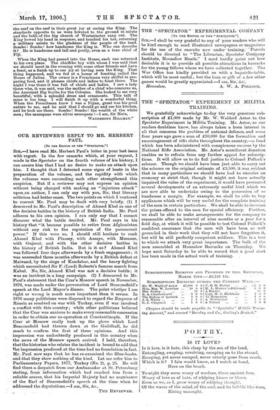• OUR REVIEWER'S REPLY TO MR,. HERBERT PAUL.
LTO TEE EDITOR OF THE SPECTATOR."1
have read Mr. Herbert Paul's letter in your last issue ,with'regret. In the few remarks which, at your request, I Made in the Spectator on the -fourth volume of his history, I can assure him that I had no desire to make an attack upon him. I thought that I detected some signs of haste in the preparation of the volume, and the rapidity with which the volumes were succeeding each other. strengthened this suspicion. But if a reviewer may not express -an opinion without being charged with making an "injurious attack" upon_an author, I can only say with you, Sir, that literary criticism had better cease. The two points on which I ventured to 'correCt 'Mr. Paul may be dealt with very briefly. (1) I demurred to Mr. Paul's description of Ahmed Khel 'as one of the decisive battles in the history of British India. Mr. Paul adheres to his own opinion. I can only say that I cannot -discover what the battle decided. Mr. Paul says in his 'history that "it became possible to retire from Afghanistan 'without any risk to the reputation of the paramount power." If this were so, I should still hesitate to rank 'Ahmed Khel with Plassey, with Assaye, with Meeanee, -with Gujerat, and with the other decisive battles in the history of British India. But is it so ? Ahmed Khel was followed four days afterwards by a fresh engagement ; it was succeeded three months afterwards by a British defeat at Maiwand, by the siege of Kandahar, and the heavy fighting which necessitated Sir F. (Lord) Roberts's famous march from Kabul. No;Sir, 'Ahmed Khel was not a decisive battle ; it was an incident in a long campaign. (2) I demurred to Mr. -Paul's statement that the Czar's Moscow speech in November, 1876, was made under the provocation of Lord Beaconsfield's speech at the Lord Mayor's dinner. The point whether I am right or wrong is much more important than it seems. In 1876 many politicians were disposed to regard the Emperor of Russia as redolved on war with Turkey, even if war involved a confliet with this country ; while other politicians believed that the Czar was anxious to make every reasonable concession in order to obtain our co-operation at Constantinople. If the Czar at -Moscow really took up the glove which Lord Beaconsfield bad thrown down at the G-uildhall, he did much to confirm the first of these opinions. And this impression was undoubtedly produced in this .country when the .news of the Moscow speech arrived. I hold, therefore, thatthe historian who relates the incident is bound to add that the impression produced at the time had no foundation in fact. Mr. Paul now, says that he has re-examined the Blue-books, and,that they show nothing of the kind. Let me refer him to Parliamentary Papers, 1877, Turkey (No. 2), p. 25. He will find there a despatch from our Ambassador at SE. Petersburg 'stating; from' information which had' reached him from a reliable source, that his Imperial Majesty had no cognisance of the Earl of Beaconsfield's speech at the time when he addressed the deputations.—I am, Sir, &c.,
THE REVIEWER.






































 Previous page
Previous page